We are grateful to Zara who worked with us in August 2021 to share her story here. Sadly, she passed away in October 2023. We remember Zara as we continue our work to raise awareness of this devastating disease and to fund research to help find a cure. She will be forever in our hearts.
NHS clerk Zara Taylor, from Blackpool in Lancashire, was 30 when she was diagnosed with an aggressive, grade 4 brain tumour during the COVID-19 pandemic. Zara, who was married to Jordan, received her devastating diagnosis in January 2021, after she suffered seizures out of the blue. Prior to that, Zara hadn’t had any brain tumour symptoms. Zara pursued privately-funded chemotherapy alongside her standard of care NHS treatment. Determined not to focus too much on her stark prognosis, Zara set up a Fundraising Group known as Zara’s Appeal for a Cure to make a difference and continued to live life to the full for as long as she could. By the time of her death, Zara’s Appeal for a Cure had raised enough to sponsor the equivalent of seven days of research.
Zara told us her story…
On 15ᵗʰ December 2020, I had a minor gynaecological procedure under general anaesthetic. It went smoothly and I didn’t suffer any complications. However, one morning a couple of days later, I was sitting on my bed, about to get ready for the day, when my eyes started flickering and I couldn’t keep them open. At first, I thought I may have just been having a ‘funny turn’ after the operation but when I realised that I didn’t know what day of the week it was, I rang my husband Jordan, who was at work. He was really worried about me so called his mum Pam, who lives just across the road, and she came over to find me sitting at the bottom of the stairs. I had no recollection of what had just happened. I couldn’t remember that I’d been in hospital that week, or the fact that my dad had been over to see me earlier that morning. My mum came over and she rang 111. They advised us to go to A&E at Blackpool Victoria Hospital.
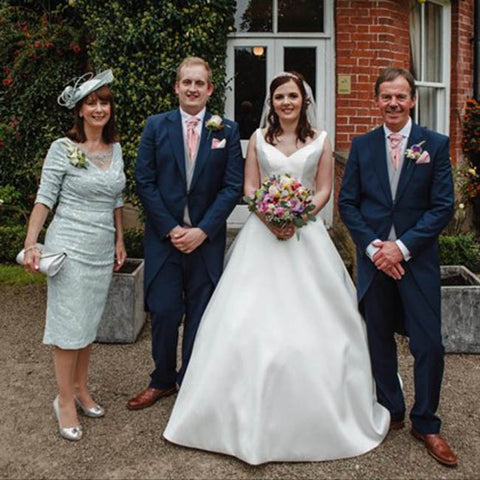
We went to the hospital but after just a few blood tests, I was sent home without being referred for further investigation.
After that episode, I was fine for the next couple of weeks. I had no problems over Christmas and was still going to work and driving. Then, on New Year’s Day, I was at home getting ready to go to my mum’s, when all of a sudden, I fell into the dog bed we have in our bedroom for our two Shar Peis, Tia and Lola.
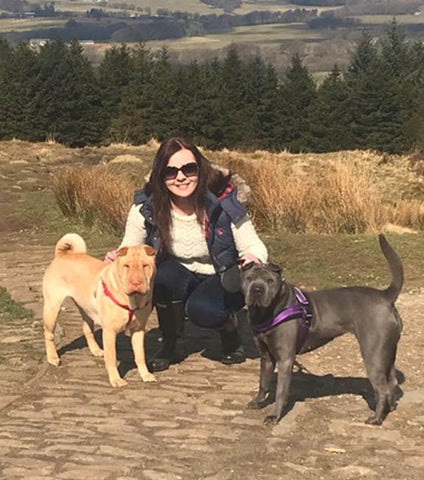
Jordan saw me fall and at first, he thought I was joking around. It wasn’t long, however, until he realised that I was having a seizure. He rang for an ambulance and the paramedics were there, as I came round. I was taken into hospital, where they did more blood tests and again, I was sent home. They advised me to go back in if it happened again. With hindsight, I can’t believe that I was told I could continue driving and that no further tests were carried out.
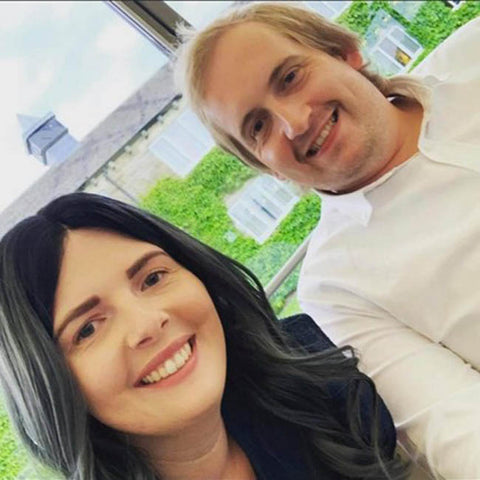
A week-and-a-half later, on 12ᵗʰ January 2021, I was in the kitchen preparing my lunch to take to work when I felt another seizure coming on. I tried to shout to Jordan but no words came out of my mouth. Then, I fell to the ground as I fitted uncontrollably. Once again, an ambulance was called and I was taken to A&E. This time, I saw a consultant, who sent me for a CT scan. When they told me they were putting contrast dye in my arm part-way through the procedure, I knew something was wrong.
Afterwards, my fears were confirmed when the doctor said that they’d found ‘something’ in my brain. I was sent for an MRI scan later that day, to try to get a more accurate diagnosis.
After the MRI, the doctor came in and asked if I had anyone with me. I knew then that it would be bad news. I rang my friend at work and as our office is just down the corridor, she came straight away and together we waited for Jordan to arrive. When he got there, we were told that they had found a tumour, 52 millimetres in size, but they didn’t know what type it was. I had to go home and wait for Royal Preston Hospital to ring me, to discuss the next steps. In the meantime, I was put on anti-seizure medication and steroids, to reduce the swelling in my brain.
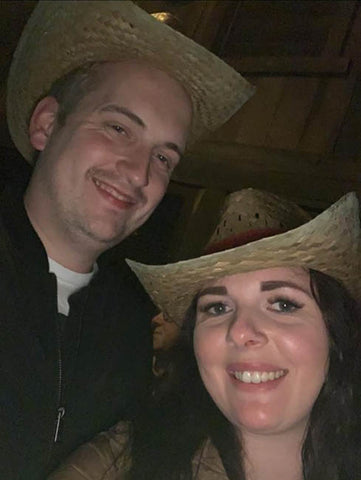
A couple of days later, I got a phone call from Royal Preston, inviting me in for an appointment with a consultant neurosurgeon on 26ᵗʰ January 2021. Jordan and I went in together and we were shown the MRI scan images, which revealed a tumour at the front of my brain, on the right-hand side. My consultant was really nice and put us at ease. He said they still didn’t know what type of tumour it was but that it looked like it consisted of a mixture of high and low-grade cells. I was given the option to either ‘watch and wait’ or to have an operation to remove the tumour. I asked my consultant what he would do in my position and he said he would opt for surgery. He talked me through all the risks, which included paralysis, loss of bladder function and even death. As if that wasn’t enough to take on board, he then said that there was a possibility it would be an awake craniotomy, meaning I would be woken up and remain conscious for part of the operation. The idea of awake brain surgery was terrifying.
My operation took place on 5ᵗʰ February 2021. Because of the COVID-19 restrictions, Jordan was only able to drop me off at the hospital; he couldn’t come in and wait with me. We were told the operation was likely to last up to six hours and that I could expect to be in hospital for between seven and 10 days, with no visitors allowed. Fortunately, my aunty, Carla Taylor, who is training to be nurse, was working on the ward where I was staying. She would bring me treats, such as crisps and sweets, to help make up for the horrible hospital food I was being served. It was nice to have a friendly face to come and see me in what was otherwise a lonely situation.
I met my surgeon, Mr Isaac Phang, who was lovely. He asked me if I had any questions and I said: ‘Am I going to die?’. He replied: ‘Not on my watch’.
I was in the operating theatre for eight hours. Luckily, in the end, I didn’t need to be woken up during the operation. That was a huge relief. I felt fine after surgery; realising I could talk and move my arms and legs was amazing. I asked the nurses to ring Jordan for me, as I’d been in theatre for longer than we were expecting. He couldn’t believe that I was talking to him from the recovery room. He was amazed at how well I sounded and I was just so happy to be alive.
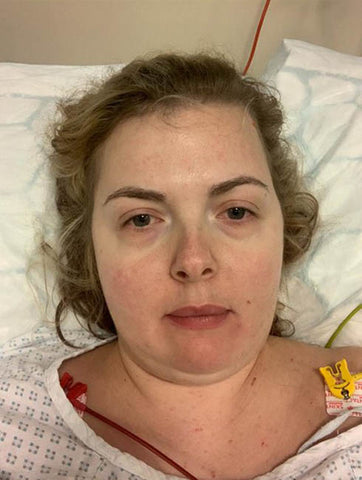
I was discharged on Sunday 7 February, just two days after my craniotomy. Having looked at the post-operative MRI scan images, Mr Phang was confident that he’d got all of the tumour out. I continued to recover well at home and was fortunate to have great support from Jordan, my parents and my in-laws, who rallied round to look after me. My sisters-in-law, Kendall and Robyn, sat and brushed and unknotted my hair after I couldn’t wash it until a week after my operation. I had to wait until my stitches had been taken out. They were so caring and helpful as they tidied it all up for me and plaited it.
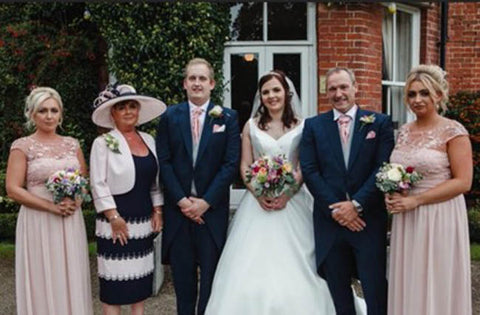
Ten days later, I got a call to say that Mr Phang wanted to see me with the results from the biopsy. When we arrived, he was with a nurse called Jacquie, who I hadn’t seen before. Mr Phang delivered the bad news that my tumour was high-grade and that I would need radiotherapy and chemotherapy. It came as a nasty shock. My aunty had been treated for a brain tumour previously but it was low-grade and she recovered well. I really wasn’t expecting my tumour to be cancer. Mr Phang said that because of my age, he would ‘throw everything at it’ and give me every possible treatment.
He asked if I wanted to know the prognosis. I said no. However, a few days later I had my first appointment with the oncologist and she referred to the tumour as a glioblastoma. Again, I said I didn’t want to know the prognosis but from my own research, I knew that the average survival time is devastatingly short – just 12-18 months. Jordan and I were in utter shock; we just stared at the walls, not able to comprehend what we were hearing. After my consultation, I spoke to a lovely nurse, who said they’d had plenty of patients, who were still alive and well five or even 10 years post-diagnosis. She told me about a private clinic in London, which offered alternative cancer treatment. She encouraged us to get in touch with them.

Before I explored private options, I underwent the standard of care treatment for glioblastoma on the NHS, which starts with six weeks of radiotherapy and concurrent chemotherapy Temozolomide (TMZ). My radiotherapy began on 15ᵗʰ March and I had to rely on the generosity of my friends and family, who kindly drove me to and from the daily appointments at the Rosemere Cancer Centre in Preston, which is a 30-mile round-trip. Thankfully, I coped really well with the treatment. Other than some tiredness, I felt fine. The worst thing about it was losing clumps of my hair.
I have long, thick hair and it was really upsetting to see it fall out. I have experimented with wigs though – I currently have three and enjoy trying different colours and styles.
After my radiotherapy, I got in touch with the Care Oncology Clinic (COC) in Harley Street, London, as I had a month’s break between radiotherapy and my next round of chemo. I sent them all my scans, clinical letters and medical history. I met my consultant, Dr Hariharan Kuhan, via a virtual consultation and he said I’d done the right thing to start during my month’s break. He prescribed metformin, normally used to treat diabetes by limiting glucose overload, atorvastatin, normally given to heart patients to cut cholesterol and the antiparasitic drug, mebendazole.
At the beginning of June, I restarted TMZ, which I take in tablet-form at home. My most recent scan, in the middle of June, revealed no tumour growth since my operation, which is really good news. My next scan is at the end of August. I am now on the strongest chemotherapy I can possibly be prescribed and this brings with it some unpleasant side effects. I’m always sick on the first day of taking the chemo and food is no longer my friend, as my smell and taste has changed. This is contrary to when I was on steroids and I wanted to eat everything in sight! I put on lots of weight but I am now losing weight, due to my lack of appetite.
I am back at work on a phased return but continue to work from home, due to the ongoing risk posed by the pandemic. Even though most restrictions have now been lifted, I remain cautious and I’m careful about where I go, to avoid crowds. I have been vaccinated and wear a mask when I go out.
I haven’t been able to drive since receiving my diagnosis and that is really frustrating. After suffering from seizures, I lost confidence and even going out to walk the dogs on my own was daunting but gradually, that is improving and I’m determined not to let this thing beat me.
I’m due to finish my chemo in the autumn and I continue to have quarterly scans, to check the status of my tumour. I try not to think too much about the seriousness of my diagnosis and don’t let negative thoughts creep into my head. My brain tumour has obviously put certain plans on hold, such as starting a family but I do sincerely hope that Jordan and I will become parents one day.
I want to live life to the full and make the most of every day. Going to the Maldives and staying in a swim-up beach hut is definitely on my wish list and I hope to fulfil that dream in the near future.
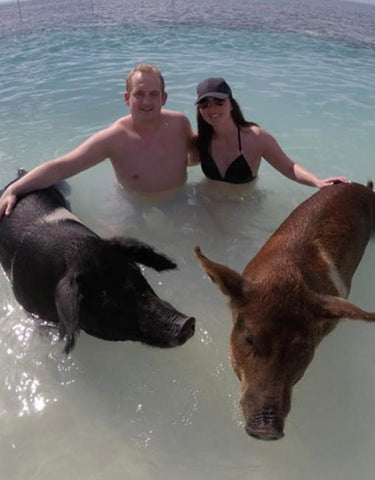
I have found comfort from connecting with other brain tumour patients on social media and I came across Brain Tumour Research on Facebook. In May, I took part in the charity’s Jog 26 Miles in May Challenge, raising £4,060, which I was delighted with. I wasn’t able to run the miles but I completed them by walking and I’m proud of my achievement, as I continue to try to regain my fitness. My dad Keith is currently taking part in the Cycle 274 Miles in August Challenge to help raise some more funds. He’s amazing and I’m so lucky to have his support and the support of all my wonderful family. Jordan and I don’t talk much about my brain tumour, we just get on with things and look after one another.
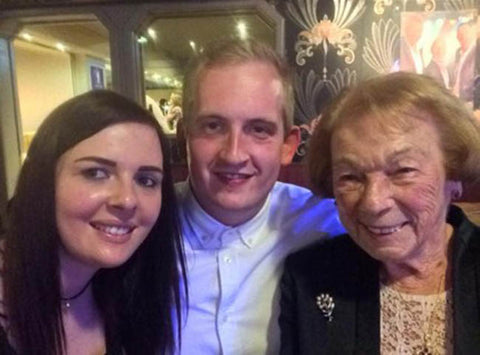
With such a great support network around me, when Brain Tumour Research told me about their Fundraising Groups, I was keen to launch my own, through which I hope to raise thousands of pounds for this vital cause. It will bring together my friends, family and colleagues, who are as keen as I am to find a cure for this awful disease. I want to help stop the devastation it causes and raise awareness of the severe lack of funding into this area of cancer research.
Zara Taylor
August 2021
Brain tumours are indiscriminate; they can affect anyone at any age. What’s more, they kill more children and adults under the age of 40 than any other cancer... yet historically just 1% of the national spend on cancer research has been allocated to this devastating disease.
Brain Tumour Research is determined to change this.
If you have been inspired by Zara’s story, you may like to make a donation via www.braintumourresearch.org/donation or leave a gift in your will via www.braintumourresearch.org/legacy.
Together we will find a cure.

